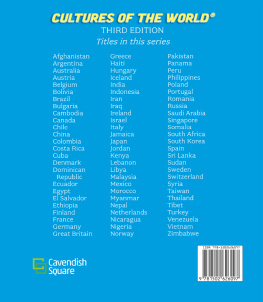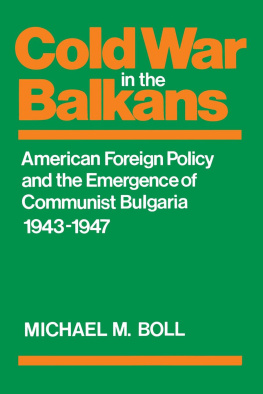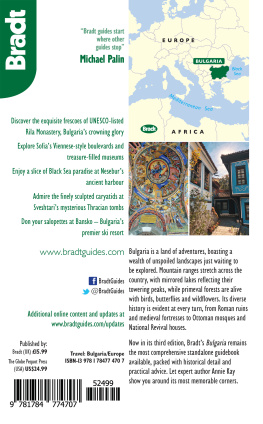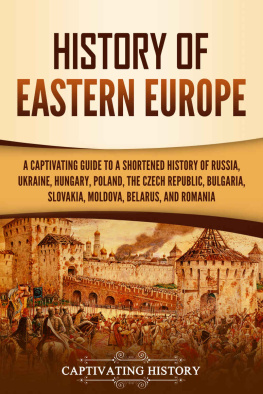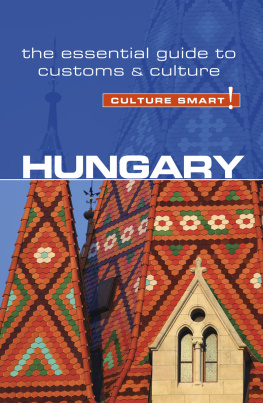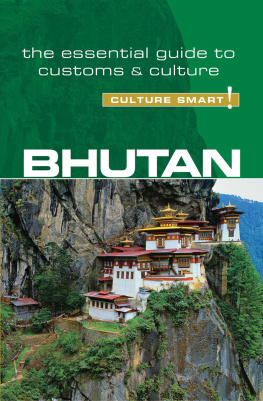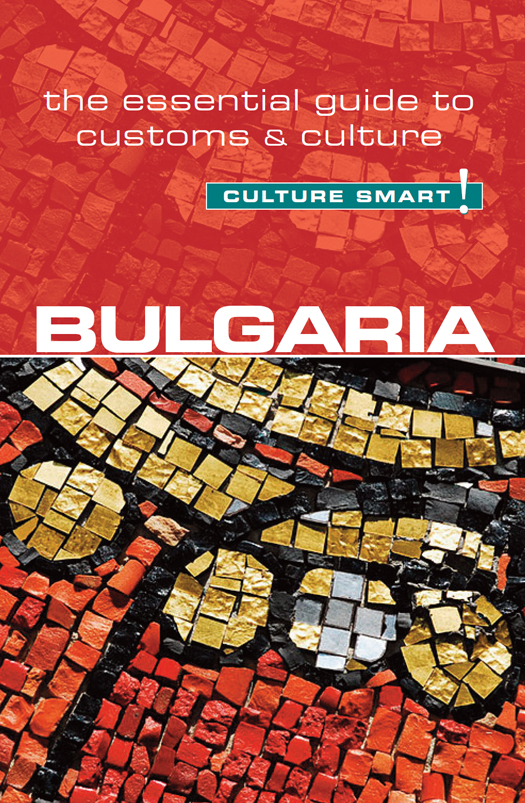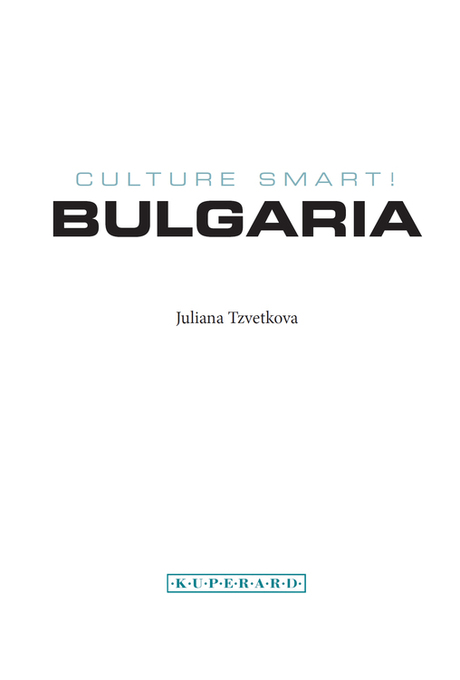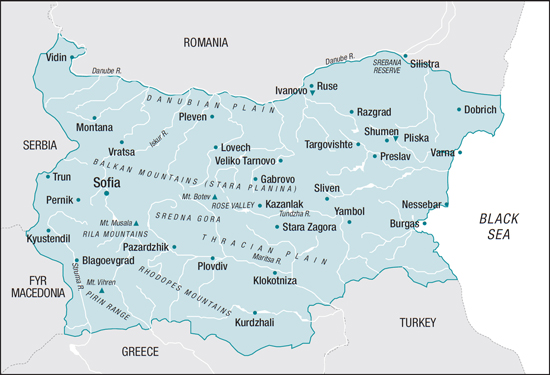Copyright 2015 Kuperard
All rights reserved. No part of this publication may be reprinted or reproduced, stored in a retrieval system, or transmitted in any form or by any means without prior permission in writing from the publishers.
Culture Smart! is a registered trademark of Bravo Ltd.
ISBN 978 1 85733 713 6
eBook ISBN: 978-1-85733-714-3
British Library Cataloguing in Publication Data
A CIP catalogue entry for this book is available from the British Library
First published in Great Britain
by Kuperard, an imprint of Bravo Ltd
59 Hutton Grove, London N12 8DS
Tel: +44 (0) 20 8446 2440 Fax: +44 (0) 20 8446 2441
www.culturesmart.co.uk
Inquiries:
Series Editor Geoffrey Chesler
Design Bobby Birchall
Cover image: Mosaic detail from the monument to the Founders of the Bulgarian State at Shumen. Dobromir Stoychev / Alamy
Images on the following pages reproduced under Creative Commons Attribution-Share Alike 4.0 International license: P171.
Creative Commons Attribution-Share Alike 3.0 Unported license: Kmrakmra.
Creative Commons Attribution-Share Alike 2.5 Generic license: Nenko Lazarov.
Creative Commons Attribution-Share Alike 2.0 Generic license: (bottom) Ann Wuyts.
GNU Free Documentation License, Version 1.2: iStock.
v3.1
About the Author
JULIANA TZVETKOVA is an academic and intercultural intelligence trainer. She was born and educated in Bulgaria, and has an M.A. from Sofia Universitys Faculty of Classic and Modern Philology. After graduation she taught at the Medical University of Sofia and translated fiction, as well as documentaries, feature films, and cultural series for Bulgarian National Television. She also did translating, interpreting, and research for the Economist Intelligence Unit in Sofia. In 1998 she moved with her family to Canada, where she taught for a couple of community colleges in Toronto. Juliana started her intercultural training experience teaching adults in Dubai. She has worked around the globefrom Sofia to Luanda, Toronto to Shanghai, and in Aktau in Kazakhstanfor Centennial College on international projects. Today she continues to provide intercultural intelligence consulting and training while writing and working on her Ph.D. in philosophy.
The Culture Smart! series is continuing to expand.
For further information and latest titles visit
www.culturesmart.co.uk
The publishers would like to thank CultureSmart!Consulting for its help in researching and developing the concept for this series.
CultureSmart!Consulting creates tailor-made seminars and consultancy programs to meet a wide range of corporate, public-sector, and individual needs. Whether delivering courses on multicultural team building in the USA, preparing Chinese engineers for a posting in Europe, training call-center staff in India, or raising the awareness of police forces to the needs of diverse ethnic communities, it provides essential, practical, and powerful skills worldwide to an increasingly international workforce.
For details, visit www.culturesmartconsulting.com
CultureSmart!Consulting and CultureSmart! guides have both contributed to and featured regularly in the weekly travel program Fast Track on BBC World TV.
contents
Map of Bulgaria
introduction
One of the oldest countries in Europe, Bulgaria became the youngest member of the European Union on January 1, 2007. If there is a word that best describes the Bulgarians, it is proud. Founded in 681 CE , the country takes pride in being the oldest European nation-state never to have changed its name. It is also proud to have given the world the Cyrillic alphabet, the first electronic wristwatch, the electronic digital computer, and some of the twentieth centurys greatest opera singers. Most of all, Bulgarians are proud of their long history and the natural beauty of their landBulgaria and paradise are often used in the same sentence.
Situated on the Balkan Peninsula, Bulgaria was at the crossroads of Europe and Asia and a melting pot of ancient cultures. Today, four pan-European transportation corridors connect Western Europe to Eastern and Southeast Europe and Asia across its territory. Invasions and waves of migration, starting from neolithic and classical times, have contributed to its unique cultural mosaic. Bulgaria boasts the oldest hoard of gold treasure in the world. The seventh-century Bulgarian empire dominated the Balkans and was a powerhouse of Slavonic culture. Later, Ottoman conquest and Soviet influence left their mark on the national psyche, and now the beautiful folk song flying in NASAs Voyager space probes as a message to other intelligent species out there is Bulgarian.
Bulgarias colorful traditions are rooted in an ancient pagan past and twelve centuries of Orthodox Christianity. The New Year starts with the lucky back-tapping surovakane rite. Bulgarians celebrate name days, such as the patron saint of wine making, Trifon Zarezan; Baba Marta, marking the end of winter, when red and white yarn marteniza adornments are worn; the day of the Slavonic alphabet, of Bulgarian enlightenment and culture; and very many other holidays. To throw a great party one needs great company, and the Bulgarians are famous for their hospitality, warmth, well-stocked tables, and lively music. Easygoing, and with a great sense of humor, they enjoy making new friends and know how to cherish old ones.
Today, Bulgarias seaside and winter resorts attract many visitors, while its rapidly developing economy draws investors from around the world. This book is for vacationers, adventure seekers, businesspeople, and lovers of ancient culture and art. It will familiarize you with this small but beautiful land and its complex people. It describes the formative influences on Bulgarian society and the way people interact with foreigners and each other. It offers important insights and practical advice that will smooth your path and deepen your experience in this intriguing country.
Dobre doshli v Bulgaria, skapi priateli! (Welcome to Bulgaria, dear friends!)
Key Facts
| Official Name | Republic of Bulgaria | Adopted in 1991 after the first democratically held elections |
| Capital City | Sofia, since 1879. Population 1.2 million (Census 2011) | Known as Sofia since 1376. Older names are Serdika (Roman), Triadiza (Byzantine), Sredetz (Bulgar). |
| Major Cities | Plovdiv, Varna, Burgas |
| Area | 42,855 sq. miles (110,994 sq. km) | Black Sea, Danube River (mostly with Romania) |
| Borders | Romania, Serbia, Macedonia, Greece, Turkey |
| Climate | Continental climatic zone (north) Humid subtropical climate (east) Mediterranean (south) | Four seasons in continental temperate zone; the south and coastal regions have milder weather patterns. |



